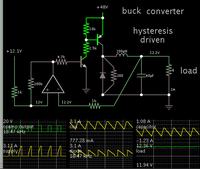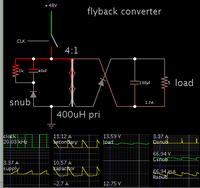actor23
Member level 3

- Joined
- Dec 12, 2014
- Messages
- 56
- Helped
- 1
- Reputation
- 2
- Reaction score
- 1
- Trophy points
- 8
- Activity points
- 515
Hello all ;
Let me explain my question simple
I designed 3 phase bldc motor driver. I have 48V (Max 55V) Lithium-ion based battery. I need 12V-2A and 5V-0.5 A(maybe lower) two DC output. 12V to feed my gate drivers(TLP250(6)) and 5V to feed my microcontroller. 12V output should share common ground with 48V battery but 5V must be seperate isolated ground.
I examined the push-pull smps but realized that it is used for very high power applications. I think that i choose flyback smps topology which is more efficient and enough power for my design.
My idea is that i designed 48V to 12V flyback or the topology that you suggest me then use optocoupler or optoisolator as dc-dc converter(12 to 5) to feed microcontroller also requirements for isolated ground.
Any ideas,suggestions are really appreciated.
Thanks in advance.
Let me explain my question simple
I designed 3 phase bldc motor driver. I have 48V (Max 55V) Lithium-ion based battery. I need 12V-2A and 5V-0.5 A(maybe lower) two DC output. 12V to feed my gate drivers(TLP250(6)) and 5V to feed my microcontroller. 12V output should share common ground with 48V battery but 5V must be seperate isolated ground.
I examined the push-pull smps but realized that it is used for very high power applications. I think that i choose flyback smps topology which is more efficient and enough power for my design.
My idea is that i designed 48V to 12V flyback or the topology that you suggest me then use optocoupler or optoisolator as dc-dc converter(12 to 5) to feed microcontroller also requirements for isolated ground.
Any ideas,suggestions are really appreciated.
Thanks in advance.




